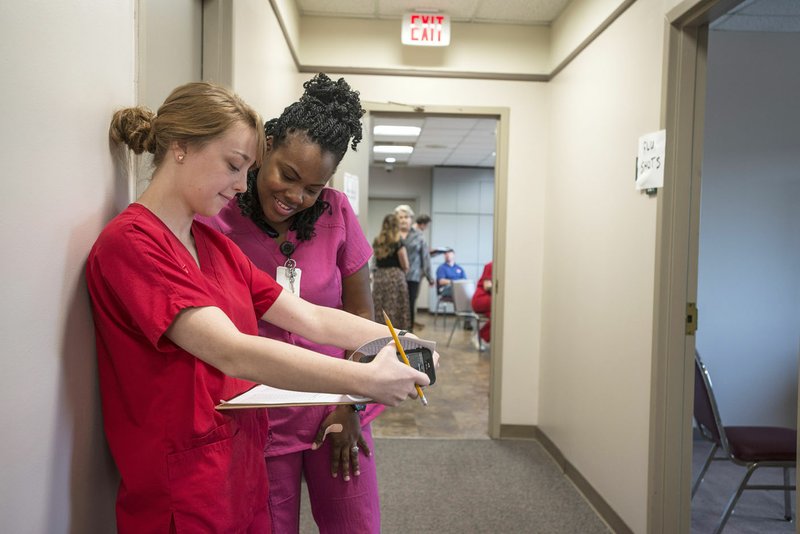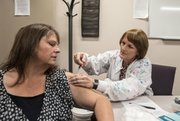FAYETTEVILLE -- Members of the Bentonville hazardous material response team huddled around a whirring, briefcase-sized machine as it analyzed the chemical content of a white, powdery substance looking suspiciously like the Sweet-N-Low on the counter across the room.
The whirring quieted after a few minutes, then came the answer: The powder was indeed a sweetener.
Emergency management
To find out more about each county’s emergency plans and services, contact their emergency management departments:
• Benton County: www.bentoncountyar.…, click “Departments,” or 479-271-1004
• Washington County: co.washington.ar.us, under “Departments” heading, or 479-444-1722
Source: Staff report
The substance wasn't serious, but the practice was. Benton and Washington county emergency responders on Thursday worked with the Arkansas Department of Health and other agencies on a bioterrorism drill meant to make sure everyone involved knows each other and what to do if a given threat happens in real life.
Thursday's threat was the bacteria that causes anthrax and was found in an envelope on the top floor of the Washington County Courthouse, where the hazardous material team tested it. Someone opened the envelope and, "Poof! It's airborne," said John Luther, the county's emergency management director.
That's where the second major part of the drill came in. Dozens of county employees streamed through the office getting their faux treatment for anthrax -- actually a regular flu shot clinic administered by the Health Department and University of Arkansas for Medical Sciences nursing students.
The combination testing and inoculating simulated on a small scale the response to a threat that could require hundreds or thousands of people to be helped quickly, Luther said. At the Sheriff's Office in south Fayetteville, Madison County personnel chipped in for a similar effort Thursday afternoon, much as they would in a real emergency.
"It's a refresher," Luther said. "It fosters communication; it fosters looking at our plans."
The Health Department has been running the drill in different parts of the state all week, spokeswoman Meg Mirivel said, starting at the central office in Little Rock on Monday. The federal Centers for Disease Control and Prevention requires the exercises for its emergency preparedness grants and oversees the Strategic National Stockpile, which holds medicines and other supplies for large-scale emergencies of all kinds.
The centers gave out more than $600 million in those grants in 2015, according to the agency's most recent preparedness report, down from more than $1 billion a decade ago. But states successfully used the training from those grants, for example, to handle possible Ebola cases in California and run public preparedness campaigns for children and families around the country, the centers report.
Arkansas received about $6.4 million of that money between 2013 and 2014. The centers report the state met its target for public health personnel response times and other measures and got perfect or near-perfect scores in the past several years on its readiness to handle national stockpile supplies.
Drills can dip into every variety of mayhem, whether it's severe weather, disease outbreaks or issues with a nuclear facility, Mirivel and Luther said. The Washington County department trains roughly quarterly and has recently focused on active-shooter scenarios, Luther said. The multi-county events like Thursday's come roughly once a year, he added.
The drills don't end with a passing or failing grade per se, but participants come together at the end to discuss what went smoothly and what should go differently next time, Luther said.
"We always get a lot out of it and a lot to think about," Mirivel said.
The practice can go into real-world work right away. Several of the same agencies running Thursday's flu clinic also ran the two public mumps vaccination clinics in Springdale's Jones Center in recent weeks. The Health Department organized those clinics and several smaller, more targeted vaccinations in response to a mumps outbreak that neared 800 confirmed or suspected cases as of Wednesday across Northwest Arkansas.
"We want these things to be efficient and flow quickly," Luther said.
NW News on 10/28/2016

